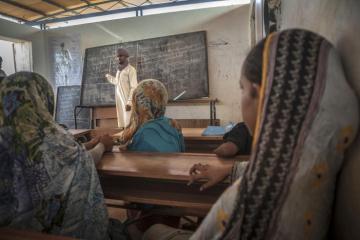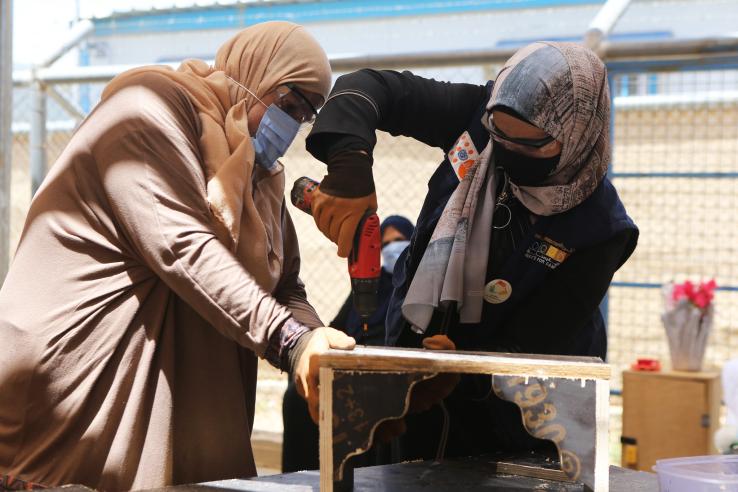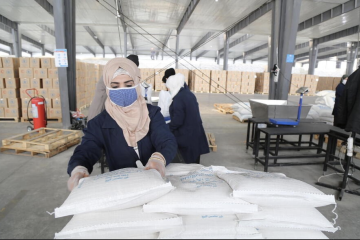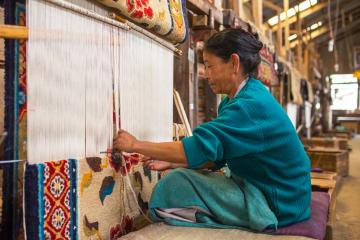
New Humanitarian Protection Initiative will help reduce harm to people affected by conflict

This piece is also posted on the Innovations for Poverty Action blog.
Today, J-PAL and Innovations for Poverty Action (IPA) launch the Humanitarian Protection Initiative (HPI), with support from the United Kingdom (UK) international development funding from the UK Government. The core of this initiative is a research fund dedicated to generating rigorous evidence to inform policies and programs that protect conflict-affected populations from harm and mitigate the effects of conflict where harm has occurred.
As conflicts flare up around the world, protection risks are increasing in complexity and severity. The United Nations Office for the Coordination of Humanitarian Affairs projects that nearly 300 million people will need assistance and protection in 2024. These risks range from increased attacks on civilians, rising sexual- and gender-based violence, continued recruitment of child soldiers, exacerbated psychological abuse and distress, to restricted access to deliver humanitarian assistance. Faced with budget constraints, humanitarian actors require evidence to make informed and timely decisions to improve protection outcomes.
Yet there is limited rigorous evidence on the comparative effectiveness of protection interventions, or on the mechanisms that drive effective protection programming. In response, HPI will equip humanitarian actors with a greater understanding of cost-effective, scalable, and context-sensitive solutions to prevent and remedy physical, psychological, social, and legal harm against conflict-affected populations.
Learning about effective strategies to prevent and mitigate violence and harm in conflict
HPI will foster partnerships for and fund randomized impact evaluations. These evaluations aim to inform the design of policies and programs to protect conflict-affected populations from violence, coercion, and deliberate deprivation, and ensure their dignity, safety and respect for their rights–with a particular focus on acute conflict settings.
Research and learning priorities identified in consultations with policymakers and practitioners generally relate to two objectives: the prevention and mitigation of harm. Humanitarian actors pursue these objectives through a variety of interventions that can be evaluated with funding from HPI, as further detailed in the initiative’s first Request for Proposals:
- Preventing physical, psychological, social, and legal harm. This objective includes the evaluation of interventions to encourage armed actors to adhere to International Humanitarian Law and exercise restraint, to curb sexual- and gender-based violence in conflict settings, and to eliminate abuse and exploitation in peacekeeping missions and humanitarian operations.
Other priority questions include whether activities such as tailored information dissemination, case management, or training can bolster communities’ self-protection capabilities and empower individuals to make informed decisions to effectively reduce exposure to violence and improve their legal situation. Additional areas of interest concern the protective effects of humanitarian actors’ presence and what measures can be taken to avoid that assistance inadvertently fuels conflict. - Mitigating physical, psychological, social, and legal harm. Evaluations that fall into this category can include family reunification programs, effective support to the families of the missing, or medical, psychological, and psychosocial support to address the repercussions of conflict-induced violence and abuse. Meaningful accountability to affected populations through existing measures such as client feedback channels as well as new, innovative solutions can equally benefit from rigorous evaluation to identify effective solutions to uncover and address abuse and exploitation.
HPI’s research and learning priorities will also include advancing on intersecting questions spanning both prevention and mitigation of harm. These questions may involve effective targeting mechanisms and spillover effects of humanitarian protection interventions, as well as refining and harmonizing measurement strategies for concepts including dignity, restraint, and self-reported measures.
Fostering accountable, inclusive, and actionable research
While adherence to the “do no harm” principle is essential in all contexts, it becomes critically important in humanitarian settings, necessitating a heightened investment in ethical research design and measurement (see Chapter III of J-PAL’s broader Learning Agenda for Humanitarian Action), a sophisticated understanding of the drivers of conflict, and uncompromising prioritization of the safety and security of research participants and staff.
Recognizing the importance of being accountable to affected populations and the risks associated with working in conflict settings, HPI is committed to upholding high standards of protection and inclusion of study participants throughout the implementation of the research project. HPI further encourages researchers and implementing organizations to invest in building strong, transparent, and equitable partnerships.
HPI seeks to identify scalable, generalizable, and cost-effective programs and policies that have significant and tangible impacts on the communities they target. In a context where many programs struggle to reach significant numbers of people or the most vulnerable segments of the target groups, research that supports overcoming barriers to scalability and broader impact will be particularly valuable. Recognizing that communities affected by violence are actively developing these solutions, HPI will aim to assist in advancing and quantifying the impact of their work.
In addition, HPI is committed to fostering greater opportunities for research led by academics from traditionally underrepresented groups. Through the HPI Scholars Program, funding and mentoring opportunities are available to researchers from or based in low- and middle-income countries (LMIC) who are interested in developing and conducting randomized impact evaluations that fall within the initiative’s scope.
What’s next?
For researchers: HPI will run Requests for Proposals (RFP) twice a year—the first of which opens today—to award research funding to promising projects around the globe. Research teams should carefully read the RFP to determine the eligibility of their project in terms of scope and team composition. Researchers from or based in an LMIC with research interests that fall into HPI’s scope are encouraged to consult the HPI Scholars Program webpage and register for a webinar on Wednesday, March 6, 2pm GMT/9am ET, to learn more about HPI’s scope and support available for proposal development.
For policymakers and practitioners: Organizations interested in evaluating the impacts of their humanitarian protection programming are invited to participate in one of the forthcoming evaluation design workshops. Applications for the next research incubator, which will take place in Bogotá, Colombia, on April 8-10, are currently open and will close on February 21, 2024. Forthcoming incubators will be organized in the MENA region, East Africa, and Asia.
To stay informed about HPI’s work, sign up for J-PAL’s newsletter and select “Humanitarian action” as an interest area here, and sign up for IPA’s newsletter here. For any questions or to discuss your project ideas, please don’t hesitate to reach out to [email protected] (J-PAL) and [email protected] (IPA).
Related Content

Randomised Evaluations in Humanitarian Action: A Learning Agenda for the Humanitarian Initiative

Rigorous evaluations for humanitarian interventions: In conversation with the World Food Programme






